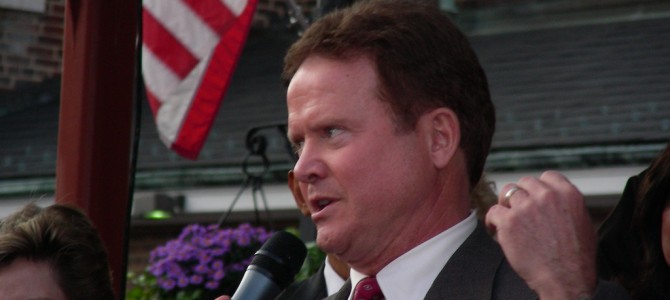It turns out that while Hillary Clinton was Secretary of State, the Clinton Foundation collected piles of cash (plus $500,000 in speaking fees for Bill Clinton) from Russian companies associated with an attempt by Putin cronies to gain control of a major North American uranium miner—for which they needed permission from Secretary Clinton’s State Department.
That’s pretty much what we expected from putting the Clintons back in the halls of power: nothing, not even national security, gets in the way of cashing in. No, I don’t think the Clintons are entirely motivated by money. There’s also power, fame, and Bill’s pathetic need for adulation. But the money is awfully nice, and somebody’s got to pay for Chelsea’s wedding.
This kind of swashbuckling graft—and it’s just the tip of the iceberg as reporters begin to dig in to the Clinton Foundation’s fundraising—opens up a huge opportunity for an ambitious Democrat to challenge the party’s “inevitable” candidate.
It’s an opportunity for a challenger from the left, but that could be a problem for Democrats, too. Republicans would be pretty happy to face off against someone like Elizabeth Warren, who could be pilloried as a far-left radical and who has never won an election outside Massachusetts. Republicans are also happy to let her have the unanimous vote of the Harvard Faculty Club.
(Meanwhile, one of the best things about the current Republican field is its delightful lack of associations with the Ivy League. Rand Paul went to Baylor and Duke. Scott Walker went to Marquette and didn’t even graduate. Rick Perry went to Texas A&M, Marco Rubio to University of Florida and University of Miami, Chris Christie to University of Delaware and Seton Hall. Even Jeb Bush went, not to Yale like his father and brother, but to the University of Texas at Austin. Improbably, the Republican field’s only connection to the Ivies is Princeton and Harvard graduate Ted Cruz—who definitely managed to avoid going native.)
I happen to think the most terrifying prospect for Republicans would be a challenge to Hillary from the right: the candidacy of Jim Webb, an old-fashioned, truly moderate “Reagan Democrat” with military credentials—Vietnam veteran and former Secretary of the Navy under Reagan—and a lot of appeal in places like Appalachia, and among blue-collar types. That’s a large part of the reason Webb managed to win a term as Senator from Virginia in 2006. (It also happened to be a good year for Democrats.)
For Republicans, Webb could actually be a formidable opponent. Because he’s not far to the left—he endorsed Republican Senator George Allen in 2000, before running against him six years later—he wouldn’t mobilize the conservative base in opposition the same way Hillary Clinton or someone farther to the left would. He would have crossover appeal; an old Reagan Democrat could win the votes of other old Reagan Democrats who have gradually become Republicans or right-leaning independents. And he would probably still get the votes of Democrats, who would be mobilized in opposition to the Republican candidate, who will either be a scary conservative or someone named “Bush,” either one of which is anathema to them.
All of this would be a big problem, if Webb were the nominee. But I feel safe giving this free advice to the Democrats precisely because Webb is an old-fashioned Reagan Democrat, so he won’t be the nominee.
I can tell this by looking at the younger generation of leftists, with whom I have had some run-ins recently. My sense is that these are people who have no personal memory of the fall of the Soviet Union and the shattering impact this had on the belief that a centrally planned economy really would work and would “bury” the capitalist West, as Khrushchev had boasted.
Nor do the younger leftists have even an echo of the memory of how the idealistic fervor of the Great Society yielded to crushing disappointment, how government anti-poverty programs becoming a grim joke. By contrast, I remember seeing Charles Murray come to campus to talk about his then-new book Losing Ground, which was all about the manifest failure of those programs.
The people who don’t remember this history are the Democrats who pushed Obama over the top in the 2008 primaries and rejected Hillary Clinton. Without this background, they have no idea what all that Clintonian triangulation in the 1990s was all about or why the Clintons felt they needed to compromise on issues like welfare reform. It just seems cynical—which it was—but they don’t understand that the Clintons were also adapting to a real political and economic necessity.
Because the Democrats never preserved this knowledge, because they fled from it, the Clinton moment didn’t last. Since then, the Democratic Party has swung back farther to the left than it has ever been.
A recent Politico article publicized a graphic showing the growing partisan divide in the House of Representatives since 1949. This is supposed to show the terrible effect of having fewer “super-cooperators” who are willing to work with colleagues on the other side of the aisle. Given that the era of these “super-cooperators” was the era in which the federal government massively expanded, what this is really showing us is the old era of the “me-too” welfare state Republicans. But the more recent history, in which the partisan divide grows, is also a measure of the death of the conservative Democrats—and the corresponding isolation of the far-left Democrats who remain.
The party that elected the closed-off blue dot you see in the lower right of the graphic, and which hailed Barack Obama as a savior in 2008, is very unlikely to vote for a Reagan Democrat in the 2016 primaries. Which is a shame for them, because it might actually be their best chance of winning.
Follow Robert on Twitter.









